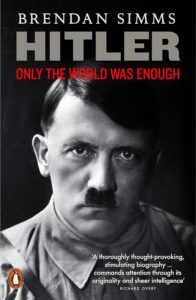 Hitler flanked this rhetoric with a carefully calibrated propagandistic effort. He gave a speech at Bayreuth—Wagner’s city—in mid September 1923, and returned about a fortnight later to speak again. On that occasion, taking up the invitation of Winifred Wagner, the Englishborn wife of Wagner’s son Siegfried, he went to the Wagner shrine at Wahnfried. There Hitler spoke to the composer’s son-in-law, the racist political philosopher Houston Stewart Chamberlain, author of the best-selling Foundations of the Nineteenth Century, upon whom he made a very favourable impression. Hitler paid homage at Wagner’s grave. He also published an autobiographical text and a selection of his speeches under the title of Adolf Hitler: His Life and His Speeches. The name on the front page was that of his associate Victor von Koerber, but the real author was Hitler. He rehearsed his political positions, including his attacks on ‘Bolshevism’ and ‘international Jewish mammonism’, but pointedly deleted all negative references to the United States, most likely in order to encourage US toleration of a successful coup. The principal purpose of the book was to cast Hitler as the saviour of Germany. Koerber-Hitler spoke of him no longer as a ‘drummer’ but as ‘an architect who is building the mighty German cathedral’. No doubt drawing on his overtures to Bavarian Catholics, Hitler had himself styled as a messianic figure, whose political awakening was compared to the resurrection of Christ, and whose writings were a kind of holy writ.
Hitler flanked this rhetoric with a carefully calibrated propagandistic effort. He gave a speech at Bayreuth—Wagner’s city—in mid September 1923, and returned about a fortnight later to speak again. On that occasion, taking up the invitation of Winifred Wagner, the Englishborn wife of Wagner’s son Siegfried, he went to the Wagner shrine at Wahnfried. There Hitler spoke to the composer’s son-in-law, the racist political philosopher Houston Stewart Chamberlain, author of the best-selling Foundations of the Nineteenth Century, upon whom he made a very favourable impression. Hitler paid homage at Wagner’s grave. He also published an autobiographical text and a selection of his speeches under the title of Adolf Hitler: His Life and His Speeches. The name on the front page was that of his associate Victor von Koerber, but the real author was Hitler. He rehearsed his political positions, including his attacks on ‘Bolshevism’ and ‘international Jewish mammonism’, but pointedly deleted all negative references to the United States, most likely in order to encourage US toleration of a successful coup. The principal purpose of the book was to cast Hitler as the saviour of Germany. Koerber-Hitler spoke of him no longer as a ‘drummer’ but as ‘an architect who is building the mighty German cathedral’. No doubt drawing on his overtures to Bavarian Catholics, Hitler had himself styled as a messianic figure, whose political awakening was compared to the resurrection of Christ, and whose writings were a kind of holy writ.
On 26 September, on the same day as the end of passive resistance in the Ruhr, the Bavarian government announced a state of emergency. Kahr was made commissary general. That same day, too, Hitler signed a proclamation in support of a ‘Battle League to Break Interest Slavery’; pointedly, the main enemy was defined as international capitalism and the victor powers rather than the German left…
Despite the local demands on his time, Hitler made serious efforts to square international opinion. He gave an interview to the American United Press at Bayreuth in which he said that the Bavarian ‘masses’ would back him over Kahr and announced that he was ‘no monarchist and would battle against all monarchic adventures, because the Hohenzollern and Wittelsbachers would merely encourage separatist divisions’. Hitler also gave an interview to the distinguished German-American journalist George Sylvester Viereck, in which he claimed to be the only bulwark against ‘Bolshevism’ and revealed his territorial ambitions. ‘We must regain our colonies and we must expand eastward’, he argued. ‘There was a time when we could have shared the world with England. Now, we can stretch our cramped limbs only to the east. The Baltic is merely a German lake.’ At around the same time, he told an American newspaper of his plans for a ‘Monroe Doctrine for Germany’, the first time he articulated a theme which was to run through his entire strategy. In mid October 1923, he made a public statement in Corriere Italiano once again renouncing any German claim to South Tyrol, as a gesture to Mussolini. He was convinced that France would support a separatist coup, but seems to have believed that Britain and the United States would at least tolerate his own Putsch.